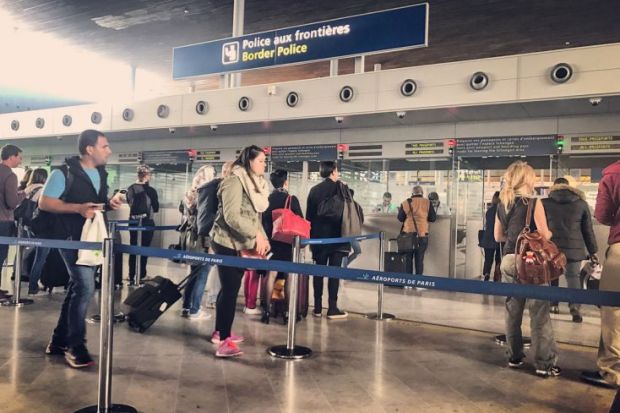After agreeing to an invitation to examine a PhD thesis recently, I had second thoughts. In half a dozen or so PhD examinations I performed in the UK before, I had always agreed on matters informally with the PhD supervisor, albeit under standard university instructions.
This time, before I could even receive the thesis, I had to agree to the human resources department’s separate instructions to first “verify your entitlement to work in the UK” by sending in a scanned copy of my passport, and then by additionally giving “sight of original documents on the day of the viva examination”.
Also, in the accompanying expenses form, no reimbursement would occur until after completion “of your right to work check”.
The fact that I have been employed at an academic charity and universities in the UK since 1984 was of no apparent consequence.
External examiners provide vital independent checks on academic standards and so rely on not being in the employ of the candidate’s university. They receive a small unrewarding honorarium that would hardly meet the minimum wage. More like peer review that is based on goodwill and trust, acting as an external examiner is not “employment” in any sense: indeed, in this case, HR specified that this is “not a contract of work”.
If even universities recognise this, then why the need for a “right to work” check? Indeed, why do even unpaid speakers nowadays also need a “right to work” check before they can give occasional unpaid lectures at British universities? The paradox is that academics can do any of these things without the need to acquire a formal right to work in the UK. This showing of passports is about something other than ascertaining one’s “right to work”.
Universities that do not comply risk having restrictions imposed on their operations. Might this explain why HR communications come across as distasteful to academics otherwise full of goodwill towards their colleagues?
Why would academic activities that have nothing to do with “work”, and that rely on a free and borderless exchange of ideas, be subjected to Home Office checks in this manner? When did the UK begin to distrust its academics and why?
The law says that the requirement to show identification pertains to all external examiners, irrespective of nationality or work status. It relates to sections 15 to 25 of the Immigration, Asylum and Nationality Act 2006, which came into force on 29 February 2008.
By 2012, such measures had been widely adopted in UK universities. However, as late as July 2013 I did not have to provide my passport for a PhD examination at a university in London.
Nevertheless, with the maximum prison sentence for an offence increasing from two to five years in 2016, this would have focused universities on further avoiding legal risks.
In another separate but related development, since the Immigration Act 2014, landlords have been tasked with determining the “right to rent” and immigrant status of their tenants. After amendments in 2016, the penalty for not complying is much more severe: landlords could be given an unlimited fine or a prison sentence of up to five years for not complying. This legislation undoubtedly would disincentivise landlords from renting to any tenant who is not a British citizen, due to visa renewal complications.
Security is a critical issue for any country, and most of us would gladly call a hotline if we see something concerning, but why burden individuals and institutions performing frontline services with border-guard duties?
The effect is inherently discriminatory. Today trusted workers are forced to spy on their clients in a manner that is not conducive to offering their services without prejudice. How can academia fare in a climate of fear based on covert reporting of suspicions over students, faculty and academic visitors?
So, although the legislation underlying these legal restrictions varies – between external examiners and ascertaining the migrant status of tenants – there is no doubt that these combine to erode trust in, and to have a chilling effect on, our public institutions. Because it is the law, we all have to comply, but to participate is to buy into an underlying parochial perspective on foreigners.
No other country has such requirements concerning academia, not even China. Universities in Burma, for example, barred foreigners for half a century, until recently. Unlike in the UK, I can now give lectures there without having to show my passport every time.
The UK today appears closer to a security state than some dictatorships we routinely denounce, with members of the public being recruited involuntarily as immigration officers. “[T]o bring our institutions to their senses” I support moral philosopher Bob Brecher’s call for “resigning as external examiners” and ask you to do the same.
Gustaaf Houtman is an anthropologist working in London and in Mandalay.
Register to continue
Why register?
- Registration is free and only takes a moment
- Once registered, you can read 3 articles a month
- Sign up for our newsletter
Subscribe
Or subscribe for unlimited access to:
- Unlimited access to news, views, insights & reviews
- Digital editions
- Digital access to THE’s university and college rankings analysis
Already registered or a current subscriber?




